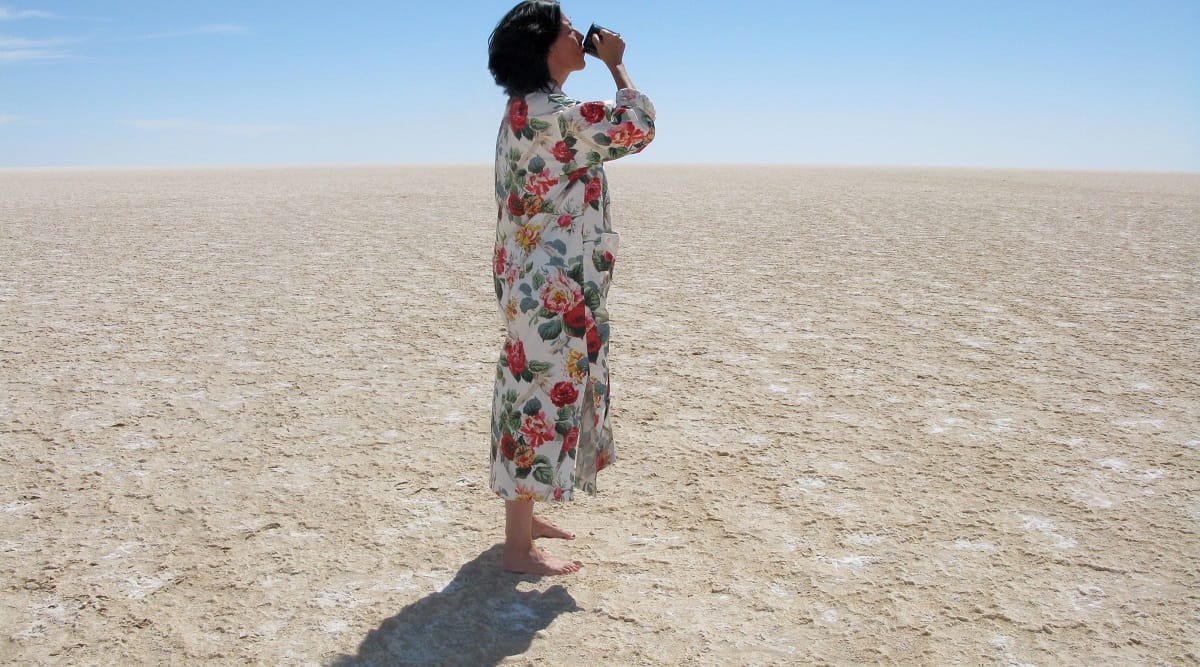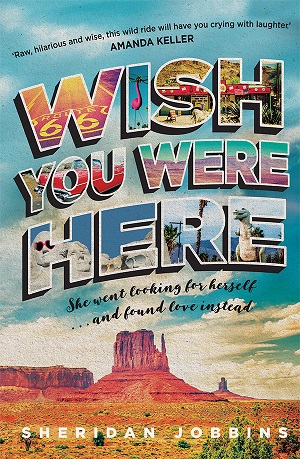
‘Wish You Were Here’ is your memoir of a broken heart and a crazy dash across America in a red spotty dress and a shiny red sports car. After many impossible adventures it ends with you finding love. Was writing ‘Wish you were here‘ a cathartic experience?
No, but the trip was! The writing was actually fun – the first couple of times, anyway. I wrote the first half in Washington waiting for Scott to join me, and the second half while waiting to sell the Chevvy. Both times, I felt compelled to sit down and capture the story while I was in the throes of it. I went without electronica – no camera, computers or sat-nav – and the adventure unfurled like this great big reality. I wanted to capture every bit of it so I could play it over and over.
A couple of years later when we were living in London, I wrote the notes out as a story for my husband. Being number 2 can sound less than best. I wanted to give him something that showed who I was when we met – what meeting him meant to me – so I wrote it out for him as a love letter.
Then I started writing screenplays with Stephan Elliott and the book laid low for a while. The only time it came out was when I lent it to girlfriends who were having a hard time – after a bust up, or a failed IVF. I gave it to one or two to say, ‘See? Sometimes nice things happen to good people at the worst possible times.’ And they seemed to find it soothing.
A while back, we moved to Switzerland for Scott’s work. There’s not much of a film industry here, so I rooted around in my drawers and short-listed the writing I thought might sell. That’s when the book transformed into a ‘rom-com memoir’ which is the version I sent to Tara Wynne at Curtis Brown. She sent it to Affirm where Fiona Henderson, their editor, transformed into the amazing thing you see today.
So, mostly that was fun – except for revisiting all that loss and anger – that was full on. I had to mop up shed-loads of self-pity, but I think the essence of hurt and bewilderment is still there. Before, there was a real risk you could slip and hurt yourself on the amount of blood I spilled on the pages.
You bare your soul in this book. Were you tempted to hold back on any of the events that happened?
Writing memoir requires more vulnerability than I imagined when it was private. There’s a dichotomy between truth and reality which is generally interesting to investigate as a writer. When it’s a personal story, though, you’ve got a lot of blind spots to work through, and that’s tough. With each pass I achieved distance and elevation from my involvement. I got perspective on myself and my actions. I became a character in the narrative, and with that I could see how bitter and cruel I’d been towards Pig. I was glad for the revision. It meant I could present us all in a kinder light – but I wish I’d changed his nickname. I wish I’d called him Mr X – or Frosty the Snowman, or anything else, really. It’s a term of endearment but it’s not cute enough to read like that every single time.
Had you always wanted to go on a road trip across America?
I’m currently working on family history, and have a theory that we’re descended from Gypsies. Both sides of my family. I don’t have proof – only two small convict references. Police told one Jobbins family member not to return to Wiltshire in the late 1700’s. We come from Wiltshire, so I take it that’s only possible if he was a traveller of some kind. The other, on my mother’s mother’s side was a convict called Shadrach Blake sent to Australia for stealing a teapot. The name and the crime both seem very Gypsy to me. I see this as a partial explanation of the wanderlust I can’t hide. I like to roam. As a kid, I dreamed of packing my whole family into in a bus and driving around Australia. I had always dreamed of America – particularly New York. In high school I loved the stories I heard about the overland bus from India to London (the only bus that flies.) The manifestation of this is that when life gets hard, I like to drive like Tracy Chapman’s song, ‘Fast Car’.
‘Wish you were here’ is being widely appreciated for its humour and pathos. Amanda Keller called it, “raw, hilarious and wise.” What is the best takeaway piece of wisdom in the book?
Life is messy
Love is irrational
Gratitude is good
When I first wrote that, the haiku concluded with ‘Money is irrelevant’. At the time I meant that I shouldn’t make decisions based on money alone. I struggled to work out how to pay for the trip – and decided in the end to trust the universe, which worked out for me. That was a valuable lesson. I grew up in a house were money was always tight. My mother worked long and prioritised our education over everything else. Saying ‘money is irrelevant’ though, sounds smug and gormless. Even though ‘gratitude is good’ is asinine, it’s the reason that money was irrelevant. Everything I received on this trip – the love, the hospitality, the car, the help – all of it was given freely. Lovingly. The least I could do is appreciate that. Say thank you. So, the lesson of the trip was letting go and forgiveness. The lesson from writing the book was gratitude – even for the transformative power of pain.
Your background is in film. What made you want to tell this particular story in print?
My background is in film but my heart is in books. I am that kid who read on the way to school. Read on the bus. Read in the bath. Read under the covers with a torch. I read at the table til I was told to put it away. I even read at parties in high school. Books are a magical portal into another world. They’re a door you open and slip into another mind. For me, having a book published, becoming an author, is the transformative life event I’ve always wanted. How could I not tell this particular story in print?
How different did you find nonfiction writing to screenwriting? Did your background in screenwriting aid you in the writing of ‘Wish you were here’?
There are plenty of differences between screen and book. The biggest (by far) was the friggin’ length. A feature film is around 20,000 words (I went back and counted) a novel is between 80 – 120,000 words. This one is five or six feature films long. I kept writing and I kept thinking, “Are we there yet?” It was such a long way.
The next big difference is that a book is a tell (you tell the story, with tons of interior life and comment). They’re written in the past tense. Films are present. One is a tell, the other is a show. In films, plays and television, everything unfolds before you in some sort of real time.
Another difference is grammar. There’s a clippetty clop short hand to writing film that becomes second nature. A script might say: Exterior. Sunset. Monument Valley. A book might say, “Entering Monument Valley from the south in the late afternoon was a perfect time to see it in all its front-lit splendour.”
Then there’s the whole thing about dialogue. My training as a journalist made me run rings around this subject. I hated ‘quoting’ people with words that they may or may not have used. That is such a no-no in reportage. I even caused real people to say made up things to service the plot. I agonised over this, but my work as a scriptwriter and love of fiction meant I wanted to fill the characters out with credible dialogue.
Being a debut book author, what has helped you the most in finishing this manuscript and finding a publisher for it?
This is my favourite question because I can give sincere, deep thanks to my nephew, Lachlan Jobbins, for introducing me to www.nanowrimo.org (National Novel Writing Month.) We did it together a couple of times – including the year I wrote ‘Wish You Were Here‘ for my husband. He also gave me ‘A Decent Proposal – How to sell your book to an Australian publisher or literary agent’ by Rhonda Whitton and Sheila Hollingworth. It’s published by the Australian Society of Authors and is a perfect manual for getting a book published.
Beyond that – we moved to Switzerland, which, as advertised, is the most boring country in the world. Perfect for writing, as long as you turn off the internet.
Sheridan JobbinsBorn in Melbourne, Sheridan Jobbins is a third generation Australian film maker. She kickstarted her career as one of the original celebrity chefs on Cooking with Sheri, earning a Guinness World Record as the youngest host of her own show at the age of nine. She was presenter on numerous TV programs, including Simon Townsend’s Wonder World! and Good Morning Australia. She was a director of the film company Latent Image Productions which produced the award-winning film The Adventures of Priscilla, Queen of the Desert. Since 2000 she has co-written screenplays with director Stephan Elliott for Disney, Warner Bros, Working Title, Hopscotch and Ealing Studios. She has published numerous short stories and articles, and mentors other screenwriters on her website www.scriptwhisperer.com. ‘Wish You Were Here’ is her first book. It is published by Affirm Press
|
 |
